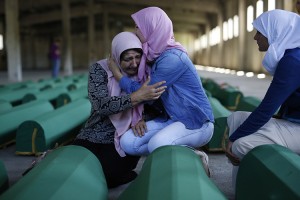20 Years After the Massacre at Srebrenica
July 13, 2015
July 11 marked the 20th anniversary of the Srebrenica (SREH breh neet sah) Massacre during the Bosnian War (1992-1995). In July 1995, Bosnian Serb forces captured Srebrenica, a town in eastern Bosnia-Herzegovina, and massacred thousands of Bosniaks (sometimes called Bosnian Muslims) who had taken refuge there.

A Bosnian Muslim woman, Ajsa Husejnovic (left), cries with family members near the coffin of her husband. His coffin was among 136 displayed at a memorial center near Srebrenica. The coffins were scheduled for burial on July 11, 2015. Forensic scientists have worked for years to identify victims of the Srebrenica Massacre. Newly identified victims from mass graves are still being re-interred in Srebrenica.
Credit: © Amel Emric, AP Photo
Shortly after the war began, the United Nations (UN) sent peacekeeping troops to the area, mainly to protect aid shipments to war refugees. In 1993, the UN declared Srebrenica, four other towns, and the city of Sarajevo (SARuh YAY voh) to be safe areas within Bosnia. Civilians in these areas were supposed to be protected from attack. The UN stationed lightly armed Dutch soldiers in and around Srebrenica to enforce the boundaries of the safe area.
When Serb troops captured Srebrenica on July 11, 1995, the Dutch forces lacked the military strength to stop them. A group of about 15,000 Bosniaks attempted to flee the safe area, but the Serbs captured most of them. Some escaped or were killed trying to escape. The Serbs claimed that the Bosniak civilians who had not fled would be transferred to other safe areas. They separated the men from the women and children, who were sent away on buses and trucks. Over the next few days, the Serbs executed most of the men. Investigators later found evidence that the Serbs killed over 7,000 Bosniak men. The UN convicted several Bosnian Serb military leaders for their roles in the massacre.
At a solemn ceremony marking the anniversary on July 11, 2015, protestors hurled stones and bottles at Serbian Prime Minister Aleksandar Vucic, a former radical Serb nationalist and ally of former Serbian leader Slobodan Milosevic. During the Bosnian War, Milosevic had urged Serbs to practice the policy of ethnic cleansing—to rid Serbian-held areas of all non-Serbs. In 2001, Milosevic was arrested and delivered to the International Criminal Tribunal for the former Yugoslavia. His trial on war crimes charges began in 2002, and he died in his prison cell in March 2006.
Other World Book articles
- Bosnia-Herzegovina (1995-a Back in time article)
- Forensic science (Uses for forensic science)
- Human rights (2001-a Back in time article)
- War crime
- Yugoslavia: “A Decade of Ruin” (a Special report)


